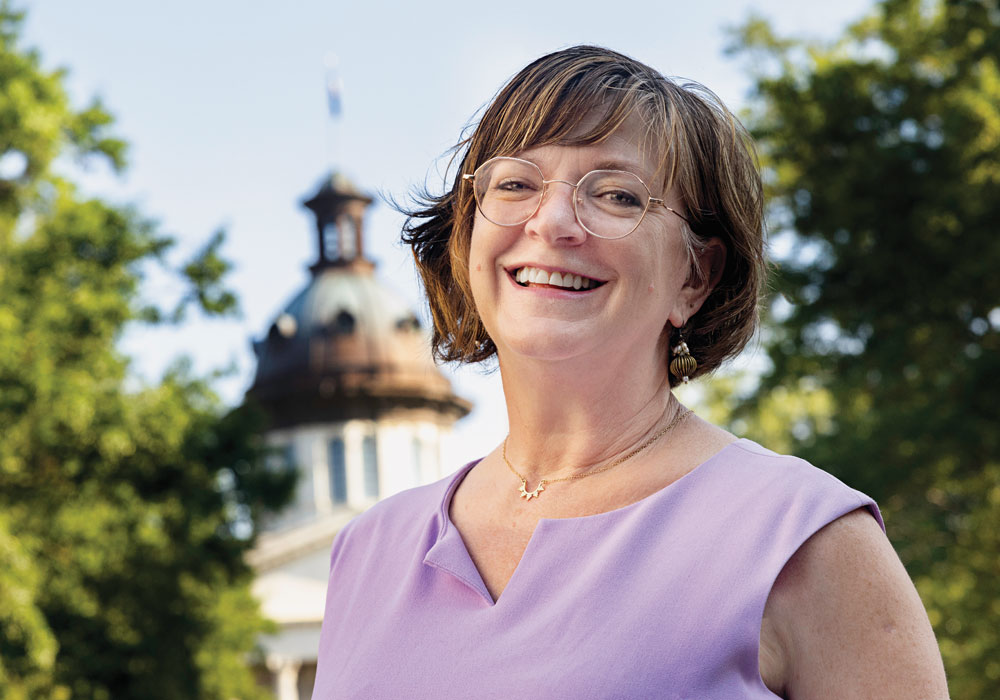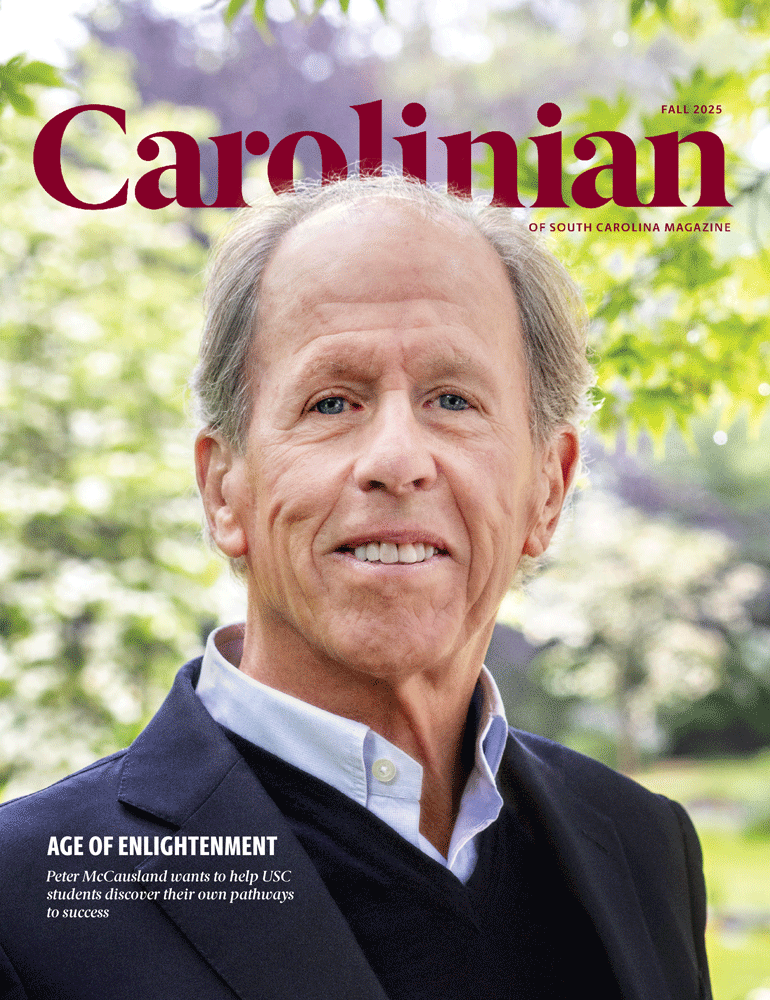If you ask victim services advocate Sara Barber why she does what she does, she’ll tell you a story that has haunted her for more than 20 years.
Shortly after starting a job with a batterer intervention program, Barber helped an abuser’s wife seek much-needed domestic violence resources. It was a chance for the woman to find safety. And then the husband moved back into the home.
“A few weeks after that, there was a story in the paper on a Monday morning about a domestic violence incident where a man had set his wife on fire at a gas station. And it was her,” Barber says. “It was that couple. She eventually died from her injuries. Her son was in the car when it happened and did not do well after that.”
One in three women in the United States has experienced violence at the hands of an intimate partner. Nationally, one in four has experienced completed or attempted rape; one in seven has been stalked. In South Carolina, 42 percent of women have experienced intimate partner physical violence, sexual violence or stalking.
Barber knows the statistics. Since 2014, she has served as executive director of the South Carolina Coalition Against Domestic Violence and Sexual Assault, or SCCADVASA, a coalition of 22 organizations — including Sistercare and Pathways to Healing in the Midlands — that connect survivors with emergency shelter, counseling and other services.
The coalition works to change the outcome for survivors in a state where deeply entrenched victim-blaming attitudes run counter to progress. For Barber, that means bringing in federal and state funding, championing improvements to laws and policies, and helping survivors access critical legal services. At its heart, it means giving survivors more agency to determine how their paths to healing should look.
“It’s a huge responsibility, and it’s important to approach that work with a level of humility and to be grounded in what they need, to listen to them,” she says. “Sometimes you can think you know someone’s experience, but you don’t. Every person’s story is unique.”
“It’s a huge responsibility, and it’s important to approach that work with a level of humility and to be grounded in what they need, to listen to them. Sometimes you can think you know someone’s experience, but you don’t. Every person’s story is unique.”
Barber’s own story started in Hull, a port city on England’s northeastern coast, but the University of South Carolina loomed on the horizon by the time she entered the American studies program at the University of Hull. There, she met an exchange student from the Palmetto State.
“She sold this place very well,” Barber says. “So I came here and had a really great time in that exchange year, made a lot of friends.”
After graduating with her bachelor’s in 1990, she returned to the States for USC’s art history master’s program, largely at the encouragement of professor Brad Collins. But art history wasn’t her calling . Neither were any of her other jobs over the next few years.
Until the job with the batterer intervention program in 2000. Before American studies, before art history, Barber had considered a career in law. Having an inside look at offenders, at victims, at the criminal legal system reawakened a version of that dream.
“It gave me ideas on what things might be effective, what accountability could look like, that there may be people for whom doing something outside the system works better,” she says.
Once again, she found herself at USC, this time for a master’s in criminology and criminal justice.
If there was any question about staying in South Carolina, the deal was sealed. She had children, citizenship, a deeper understanding of the issues and a desire to drive change in a place where it was desperately needed.
In the 25 years since the Violence Policy Center began releasing its annual When Men Murder Women report, South Carolina has ranked in the worst 10 states nationally 23 times. It has topped the list four times.
No single factor explains the state’s epidemic of intimate partner violence and sexual assault, but Barber believes culture and politics play a large role. Victims are shamed, they are often blamed for the crimes committed against them, and society is reluctant to believe that likeable people can also be offenders.
There is also a reluctance to enact state legislation that restricts abusers’ access to firearms, even though the presence of a gun in a violent relationship means a woman is five times more likely to be murdered.
“There are estimates that over a million women in this country have been threatened with a firearm,” Barber says. “If we did something about that, we could maybe stop or reduce the lethality. We just seem to, as a culture, accept that this is going to happen.”
People who have never been afraid of a partner sometimes ask why victims don’t leave. They sometimes make the mistake of believing that relationships can’t be abusive if physical violence is absent. In fact, there is a spectrum of abusive behaviors — emotional abuse, restricting a victim’s access to money, turning a victim’s children against them — that center on an abuser’s need to be in control. Even when there is no violence, these relationships are often held together by the threat of it.
“If you hit somebody once, if you draw a gun on somebody once, the next time you raise your voice in the same way, they may stop pushing back,” Barber says. “It is a way to absolutely control what’s going on in their relationship. And sometimes you see the homicides happen when that control is lost.”
For survivors, taking control back can aid recovery. That can mean seeking orders of protection or custody agreements. But legal services can be costly, which is why Barber launched SCCADVASA’s first-ever legal program in 2018. Supported through federal funding and a grant from the South Carolina Bar Foundation, the program served more than 200 survivors last year.
“Trying to navigate that without an attorney is incredibly difficult, especially for a survivor,” she says. “The systems are not always responsive, and they need somebody who knows the law and who can speak for them, because walking in with a lawyer changes the whole tone of the courtroom.”
Marginalized groups have been historically overrepresented and underserved as victims, so Barber has built partnerships to expand the coalition’s reach and strengthen services for indigenous women, immigrants, survivors with disabilities and others.
And she has continued to ask the questions that chart the next steps: What do justice and healing look like for victims who don’t want to go through the criminal legal system? How can advocates and faith communities align on messaging?
Most importantly, what more can be done to prevent sexual assault and intimate partner violence altogether? Recently, SCCADVASA hired a director of prevention and specialized advocacy.
Transformational change doesn’t happen overnight. Still, each time another assault or murder appears in the news, Barber is reminded of the work to be done.
“Sometimes the hardest thing is recognizing that we are working for long-term change,” she says. “When you work one on one with people, you get to see people moving forward. You get to see people moving to safety. You get to see them making positive changes. And when you’re working on a more macro level change, you have to have a firm inner core belief that things will get better. You have to hope, even when at times it seems foolish to do so.”

